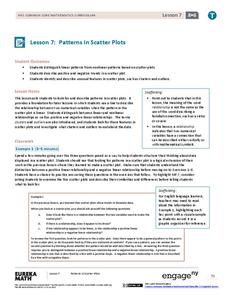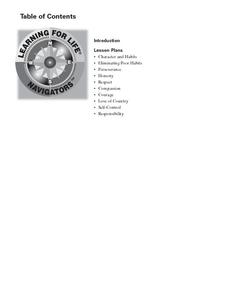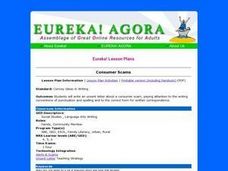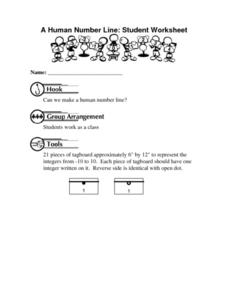Willow Tree
Scatterplots and Stem-and-Leaf Plots
Is there a correlation between the number of cats you own and your age? Use a scatter plot to analyze these correlation questions. Learners plot data and look for positive, negative, or no correlation, then create stem-and-leaf plots to...
EngageNY
Patterns in Scatter Plots
Class members investigate relationships between two variables in the seventh installment of a 16-part module that teaches scholars how to find and describe patterns in scatter plots. Young mathematicians consider linear/nonlinear...
EngageNY
Exponents
Powered up! Here's a great resource on exponents. Scholars build on their previous understanding of exponents to include all positive real number bases. Distinguishing between an and a^n is a major goal in the fifth activity of a 36-part...
Curated OER
Pros and Cons: A Childcare Debate
Students research prevailing attitudes and Rousseau's position on child rearing in the 18th century. They consider attitudes toward motherhood and childcare in our own culture through interviews with peers and family members.
Curated OER
Airbrushing on Silk
High schoolers create artwork by airbrushing on silk. This is a simple beginners project using five colors of paint and two types of stencils: positive and negative. As with all of the art lessons that come from this source, the products...
Beacon Learning Center
Cartesian Classroom
Elementary schoolers become points on a Cartesian Plane in their classroom. They review ordered pairs, positive and negative coordinates, quadrants, and the x and y axes. Pupils follow commands that help review vocabulary, such as...
Learning for Life
Character and Habits
Part of growing up is differentiating between good and bad habits; developing the positive and eliminating the negative. This resource on life skills can be adapted to almost any age group. Class members participate in multiple...
Curated OER
Best Part of Me
After listening to the story, The Best Part of Me, learners will identify a positive physical feature of themselves, and create a descriptive poem about their favorite feature. Photographs are taken, and a nice final draft of the poem is...
Curated OER
Simple Machines IV - Levers
The lever is an everyday simple machine. Youngsters learn the principles of levers and explore their many uses. Groups of pupils perform a simple lab where they lift objects with a fulcrum while placing the load in a variety of...
Curated OER
Gumdrop Crystal Models
A great way to learn about molecular structures is to make a model. Gumdrops and toothpicks are used to construct crystal models. The models are based on theories of crystal shapes that occur because of positive and or negatively charged...
Curated OER
Balancing The Day Away In Grade 2
Second graders sped the day exploring about balance by playing with and making balancing toys. They discover how varying the amount and position of mass affects the toys' balance. Pupils explore gravity and balance while playing with the...
Curated OER
Convey Ideas in Writing
Use the platforms of the 2004 presidential candidates to bring persuasive writing to your class. Young voters identify the three issues most important to them in the election and research the issues and candidates' positions. They write...
Curated OER
School Uniforms: Debating the Issue and Creating an Advertisement
Fifth graders debate the issue of school uniforms. They research, finding supporting evidence supporting their stance. Using the Lincoln-Douglas form of debate, 5th graders discuss the positive and negative issues of the topic. They...
Curated OER
Acceleration Science
In collaborative groups, physics learners design and create a web portfolio of internet resoucres explaining poitive and negative acceleration, zero acceleration, and positive and negative velocity. This is a terrific assignment for...
Curated OER
A Human Number Line: Student Worksheet
Kids are challenged to make a human number line. They line up, holding numbers from -10 to 10. They then add and subtract both positive and negative numbers, using themselves as the numbers on the number line. This is a great way to...
Curated OER
Where in the World is the Wide Web?
Sixth graders investigate how the web works and how to search effectively. In this Internet use lesson, 6th graders brainstorm positive and negative experiences they have had while on the Internet. Students view two web sites to learn...
Curated OER
A Fair Trade
Learners examine a piece of art to find objects and symbols used by the artist. In this visual art lesson, students look at Jaun Quick-to-See Smith's, "Trade Canoe for Don Quixote." They look for symbols and items that show the artists...
Curated OER
Are You Listening?
To underscore the importance of practicing good listening skills class members engage in a series of activities that model poor listening skills. In pairs and then as a whole group, class members enact different, more positive techniques...
Curated OER
Mexican Cessation
Eighth graders create a propaganda poster. In this US history lesson students research the various sides during the Mexican-American War. They present their poster and their position for or against the war.
National Security Agency
Ordering, Adding and Subtracting Integers
Prealgebrarians use colored chips, stickers, and pencils to explore the world of integers. They discover absolute value, compare positive and negative integers, and apply operations to them. A detailed procedure for the three-part lesson...
Curated OER
Incredible Integers!
There are three parts to this lesson on integers. In the first, learners explore positive and negative numbers on an actual painter's tape number line and by playing a "Hot Seat" game. In part two, they view a BrainPop video and work...
Curated OER
Unit II: Worksheet 1 - Velocity
Beginning physics scholars interpret two graphs depicting position versus time. For each graph, there is a series of questions to answer. The exercise is basic, but beneficial. Consider using it as an assessment of understanding after...
Curated OER
How Many?
Working with numbers 1-10, beginning counters complete five exercises to help them hone their skills. They examine two sets of sports balls, circling the ones at various number positions. Next, they count a set of ladybugs, recording the...
Curated OER
Introduce Vocabulary: Alexander, Who Use to be Rich Last Sunday (Viorst)
Although this vocabulary-in-context activity is focused on Judith Viorst's book Alexander, Who Use to Be Rich Last Sunday, the strategy can be applied to any book budding learners read with you. First, introduce the three new words you...
Other popular searches
- Positive Behavior
- Positive Character Traits
- Positive Attitude
- Positive and Negative Integers
- Positive and Negative Numbers
- Positive Attributes
- Positive Feelings
- Positive Exponents
- Positive and Negative Risks
- Positive Communication
- Positive Traits
- Positive Integers

























